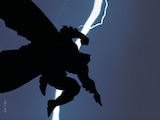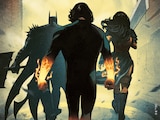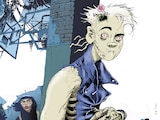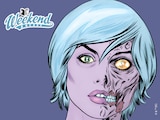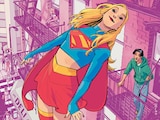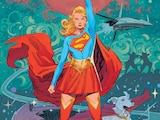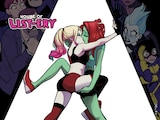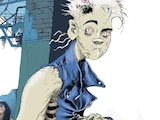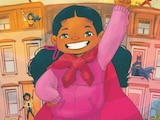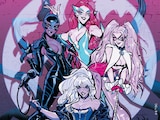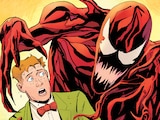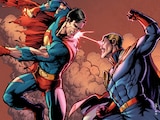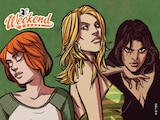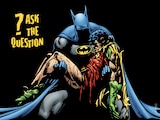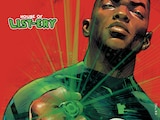Harley Quinn, the new mature-viewers animated series on DC Universe is unlike any show you’re likely to have seen before. Violent, foul-mouthed and frantic are a few words you could use to describe the new R-rated animated series. It’s also hilarious, imaginative and strangely inspiring. Best of all, within the show’s madness are some important messages and ideologies that are overall very empowering, especially for women.
As mentioned, this show is violent, something that becomes clear right away. And I am talking so violent that Harley at one point even bites off someone’s ear. Granted, the guy probably deserves it, but it’s still something that you don’t typically expect to see in a DC animated series. Something else you might notice instantaneously is that the show starts out with Harley Quinn (voiced by Kaley Cuoco) dressed in her classic jester costume (a nice treat for longtime Harley fans) and causing mischief alongside the Joker (voiced by Alan Tudyk). But don’t expect her to stay with her “puddin’” for long.

Harley is very obviously being pushed around by the Joker in what’s an extremely one-sided relationship, yet she is too naïve to see or care about that. At one point, the Joker perfectly sums up their relationship with eye-rolling condescension, “You’re the appetizer. I’m the entrée.”
After a crime gone wrong in which Batman (voiced by Diedrich Bader) intervenes, Harley ends up going to Arkham Asylum, while the Joker gets away. As she whiles away the days in an unflattering Arkham jumpsuit, Harley hopes in vain that her Clown Prince will come by and break her out of her prison confinement, but much to her disappointment (and no one’s surprise, least of all her new roommate Poison Ivy), he never comes. Harley may be disappointed, but we’re not because it gives her a chance to become close to Ivy and the show quickly becomes all the better for it. It’s also where Harley Quinn’s themes of empowerment start emerging. For Harley, it all begins with having good friends by her side to support her in any circumstance.
Ivy (who’s voiced by the absolutely perfect Lake Bell) tries her best to convince Harley that she is better off without the abusive Joker, and that he doesn’t really love her and never has. Ivy’s not the only one, either. Harley is occasionally seen engaging in conversations with her former criminal psychiatrist self. You have to wonder what Ivy and her other friends think about this because these moments definitely make her look crazier. However, what they really reveal is that deep down, Harley knows that she is better than who and what she currently is, and she knows that the Joker is bad for her.

Shedding her old costume and donning a brand-new look, a metaphor for her shedding her old ways and becoming a new woman, Harley confronts the Joker, telling him, “I want you alive, so I can see the look on your face when I’m running this town.”
It’s a powerful moment, one that really drives the narrative over the first few episodes of Harley Quinn. But proving she’s better than the Joker requires being able to play on the same field as he does, something that doesn’t come easily in the Gotham City underworld. It soon becomes clear to us and to Harley that there’s a glass ceiling when it comes to female villains on Harley Quinn. They make great minions or sidekicks, but only the guys can run crews.
This proves to be a problem as Harley attempts to strike out on her own. She wants nothing more than to assemble her own gang, but no respected Gotham criminal is willing to work for a woman—not even the ones who like her. After being denied by the likes of Bane, Scarecrow, Two-Face and the Penguin, Harley finds herself forced to work with two villains no one else in Gotham is willing to touch: Dr. Psycho and Clayface. Clayface is a softie who can’t seem to let go of his love of the theater, but Dr. Psycho seems to be somewhat of an issue. He’s powerful—the guy goes toe-to-toe with Wonder Woman, after all—but he’s something of a misogynist. This is played for laughs in the show, but I’m hoping it doesn’t continue for too long because it’ll quickly start to undercut Harley Quinn’s otherwise empowering message. Perhaps Harley can help ease Dr. Psycho down the path from sexist to sensitive. She does have a PhD, after all.

Assembling her crew and pulling off her first job is Harley’s initial step to breaking that ridiculous—but totally believable—criminal glass ceiling. And let’s be totally clear. Yes, Harley Quinn is a villain, and a violent one to boot, but you still are rooting for her, which is part of what makes this series so intriguing. You really want this evildoer to succeed at becoming the best villain in all of Gotham. In this world of entitled men who know that they are powerful and take advantage of that fact, you really want to see this wronged badass lady take over the town. She’s not going to achieve that by playing nice, and one has to wonder if that’s meant to be a message to us viewers.
It’s possible, but something tells me Harley Quinn, in spite of having such a strong feminist outlook, is largely interested in just having fun and it’s definitely that. Harley Quinn is bold, daring and crazy. It’s the perfect vehicle for the anarchic red-and-black antihero at its core. With its wild, laugh-a-second pace, fun B-, C- and D-level characters (Kite Man, hell yeah!), themes of empowerment and friendship, and top-level voice acting, this new animated show is a must watch for all adults.
Though, Harley, maybe warn us if you’re going to be chowing down on any more ears? Because yikes.
Harley Quinn premieres Friday on DC Universe. Not a DC Universe member? Click here to subscribe.
For more news, trailers and articles about Harley's animated adventures, visit our official Harley Quinn series page.
Amanda Levine covers collectibles, cosplay and pop culture for DCComics.com.

